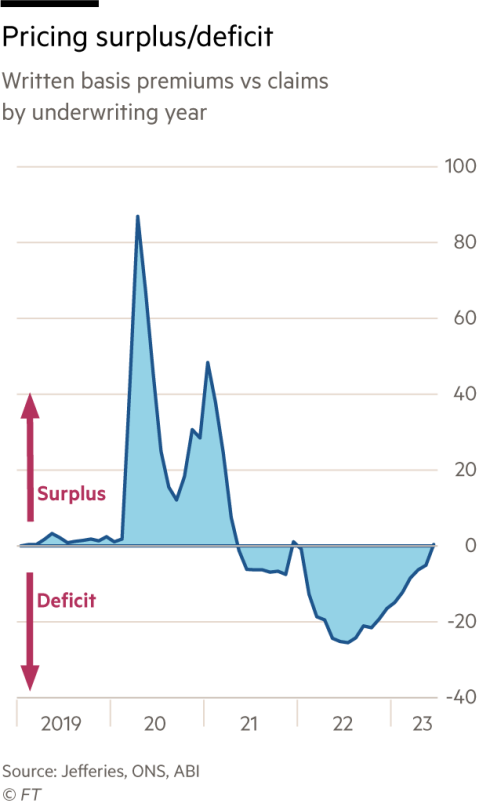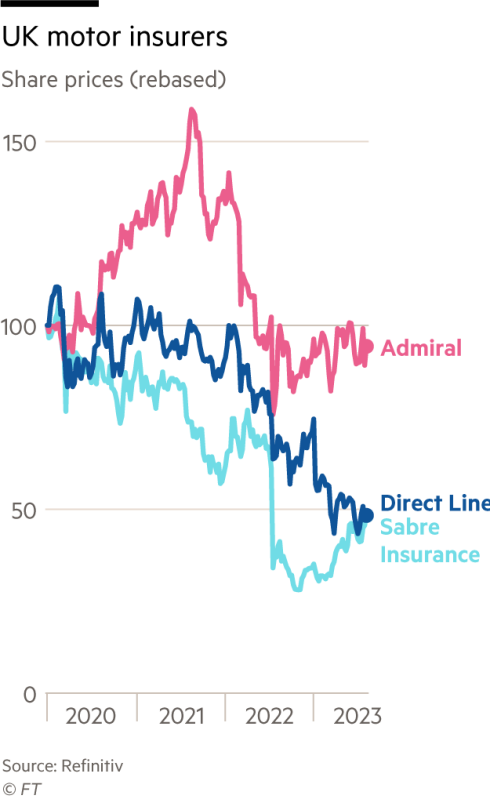Admiral/motor insurance: rising premiums set the course for better profits
The great naval tactician Horatio Nelson made it a rule never to interrupt the enemy when it was making a mistake. British insurer Admiral has followed a similar strategy, staying clear of the large losses its rivals have chalked up on underpriced risks.
Half-year results this week were a relief for shareholders. Profits rose and underwriting losses fell.
The motor insurance market has had a rough ride of late. The pandemic sent things into a skid as cars remained stuck on driveways. With fewer drivers on the road, claims fell and so did premiums.
The pattern reversed sharply as lockdowns lifted and driving resumed. Then prices for parts, labour and repairs jumped. Talk that inflation was transitory was one reason insurers were reluctant to raise premium prices. The result was the largest motor insurance loss for a decade in 2022.
Admiral shareholders paid the price. Prior to results published on Wednesday, Admiral’s share price had lost almost a third of its value since the start of last year. The stock rallied sharply with results, rising 7 per cent on the day.
A common measure of profits at insurance companies is the combined ratio. This is essentially a measure of insurance losses and running expenses combined as a percentage of the money brought in through premiums. At Admiral it was 101.7 per cent for the group in 2022, reflecting the bad year. A figure well below 100 in the first half of this year reflects the improved environment.
Premium prices are now catching up quickly to compensate. The average UK motor premium of £511 in the second quarter was the highest on record, according to the Association of British Insurers.
At Admiral, motor premiums rose 21 per cent year over year in the first six months of 2023. Compare this with the paltry 7 per cent increase in the previous six months, a figure well below the 10 per cent rate at which claims costs rose.

Admiral has traditionally led the wider motor insurance market on prices. That is reflected in the market share it lost in the first half. The number of motor customers was 7 per cent lower than last year. Better deals for drivers could clearly be found elsewhere.
Shareholders of motor insurance peer Direct Line will hope for a similar result. The company got its pricing drastically wrong and incurred steep insurance losses last year. That triggered lower dividends and the resignation of the company’s chief executive in January.

But premium rises are not the only thing helping to restore the balance of profits for motor insurers. Claims costs are stabilising too, as a result of better supplies of parts and the slowdown in second-hand car price increases.
Shareholders tend to like insurance companies for the steady, reliable returns they offer through dividend payments. These dipped slightly at Admiral, but the shares should still yield a 5 per cent cash return this year. With the prospect of further earnings upgrades, the dividend and the yield might even turn out to be higher, predicts Tom Bateman at Berenberg, an investment bank.
Investors will scrutinise results from DirectLine closely too for signs of improvement. Some analysts have speculated that losses would prompt a call for shareholders to put more money into the company. A decent performance in its motor division in results published next month will be reason to think even thin regulatory capital is enough to keep it on the road.
China banks: demolition risk
Seen but not heard is an old-fashioned guide to children’s best behaviour. Beijing bureaucrats do not want China’s young people to be seen either. The country’s statistics bureau announced it would suspend youth jobless data this week.
This indicates the dire state of the Chinese economy and financial sector. China’s shadow lenders — trust banks — are feeling that pressure. These financial institutions operate outside the traditional, more heavily regulated banking sector. As they falter, larger state-controlled banks will have to shoulder more of the risk.
China’s $2.9tn trust industry started out 40 years ago amid a booming economy. When larger local banks could not satisfy loan demand from fast-growing companies, trusts stepped in to help. Given generous licences to invest in many types of assets, they focused on property developers and high-risk companies.
The real estate crisis has taken a toll since then. The largest trust, Zhongrong International Trust, has missed at least two payments. It has investment products worth Rmb39.5bn due this year. As developers lose access to non-bank financing, the fallout among them will spread.
Rising youth unemployment is one outcome of the property slump: numbers have set new records in recent months. Officials cited the need to improve the measurement methodology. But the move comes just after factory and retail sales data that missed expectations. Altogether, this poses a serious challenge for Chinese lenders.
Lex at the FT Weekend Festival
Ever wondered How to be a Lex analyst? Join Lex writers Alan Livsey, Vanessa Houlder and Jonathan Guthrie at 3pm at the FTWeekend Festival on Saturday September 2. We will share tips and hacks for private investors. The venue is Kenwood House Gardens, Hampstead Heath. You can buy tickets here.
Shares of the largest banks, including Bank of China and Agricultural Bank of China, are still up a fifth this year. The worst of Beijing’s sector-wide crackdown appears to have passed. Yet they still trade at about a third of tangible book value, well below regional peers. Hang Seng Bank in contrast is rated at almost 1.2 times.
Investors worry that the largest local banks will need to replace credit lines, as they have done in the past. Lenders had to bail out floundering property groups last year by offering more than $160bn in fresh loans. That emergency credit is likely to expand to other high-risk local companies.
As economic data reveals weakness, the renminbi has dropped to five-year lows against the dollar. State banks may therefore have to support the currency too. With so many clean-up jobs ahead, investors should remain wary of even the biggest Chinese banks.
This story originally appeared on: Financial Times - Author:Faqs of Insurances



















